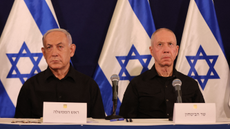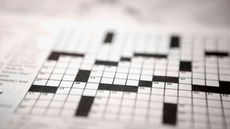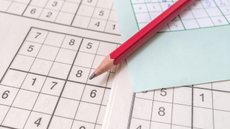Pope Francis will not help your political cause
Not even the Holy Father can break congressional gridlock


"Pope Francis gets political in remarks at White House," read the headline at The Hill.
"Pope Francis brings political agenda to Washington," said Politico.
"Pope Francis wades into U.S. politics," read The Washington Post.
Subscribe to The Week
Escape your echo chamber. Get the facts behind the news, plus analysis from multiple perspectives.

Sign up for The Week's Free Newsletters
From our morning news briefing to a weekly Good News Newsletter, get the best of The Week delivered directly to your inbox.
From our morning news briefing to a weekly Good News Newsletter, get the best of The Week delivered directly to your inbox.
Seeing all that, you might think that the pontiff had said, "Blessed are the peacemakers, and also, call your representatives and tell them to vote yes on H.R. 2451..."
Meanwhile, countless interest groups are sending out press releases saying the pope agrees with them on their issue of concern (the dumbest I've seen has to be the 30-page report from a Democratic group charging that the Koch brothers are "on the wrong side of the Holy Father"). But I have some bad news if you were hoping the pope would aid your particular partisan cause, whatever it is: The pope's visit is not going to matter much.
I suppose you can't blame the political press for interpreting the pope's trip through the lens of politics, since it's their job to view everything through the lens of politics. And it's true that the pope is visiting the White House and giving an address before a joint session of Congress while he's here. But is he really going to change the nature of any of the serious partisan arguments we have?
It's not too likely, because no matter how popular Francis might be, nobody here is just going to do what he says on any issue just because he's the pope. It's strange now to look back at the 1960 campaign and see that people were genuinely concerned that John F. Kennedy would be taking orders from the Vatican instead of doing whatever he thought was best. We'd never accuse a Catholic presidential candidate of that today, less because it would sound intolerant than because it would sound ridiculous. When ordinary Catholics don't take orders from the pope, why would a Catholic president?
Catholics have a lot of practice at picking the Church edicts they want to obey and those they don't — and that applies to both liberals and conservatives. The conservatives take all that stuff about helping the poor with a grain of salt, while the liberals have decided to agree to disagree with the Church on matters like same-sex marriage. And most everybody disagrees with the Church on birth control; in this Pew poll, three-quarters of Catholics said the Church should permit contraception, and the overwhelming majority of Catholic women of childbearing age use it.
Of course, this isn't just about obedience, it's also about the pope's ability to add his voice and moral authority to political questions. You could argue that when the pope talks about climate change, he makes concern about it seem like a mainstream position and not the province of lefties and liberals. Which is true as far as it goes, but in the U.S. today, that isn't that far. In the intensely polarized environment in which we live, even a highly popular religious figure can't change the fundamental calculus of Congress.
One of our two great parties has committed itself to fight any moves that might address climate change, a commitment that is unlikely to change any time soon. That's true despite the fact that most of their own constituents believe we ought to do something about it. The dynamics of party politics mean that the Republicans who actually get elected are going to be the ones who are most doctrinaire, on this as on most issues. That means that as long as they control Congress, there will be enough of them to stop any climate legislation, which in turn means that action will only come through the kind of regulatory changes that the Obama administration has instituted. The only thing that will produce meaningful climate legislation is huge Democratic majorities in Congress of the kind they had briefly at the start of Barack Obama's first term. Might there be a Republican member of Congress somewhere who wishes she could publicly advocate reductions in greenhouse gases, and will finally have the courage to do so now that she can claim Pope Francis as an ally? I suppose it's possible, but I wouldn't bet on it — let alone there being some significant number of Republicans who would join her.
The same is true of other issues: the more something matters to us politically, the less the pope is able to change anyone's mind here in the United States, whether he's talking about abortion or refugees or tax policy.
Even if some conservative media outlets are now going after Francis like he was Hillary Clinton because of what he's said about climate and capitalism, they needn't worry so much. While everyone is parsing the pope's words to see if he supports their position on something or other — he said he's an immigrant, so he must be criticizing Donald Trump! He said we need religious liberty, so he must be backing Kim Davis in Kentucky! — what will come out of this visit is a lot of selfies, a lot of media puff pieces, and probably a jump in the pope's popularity. But politically, everything will stay just the same.
Sign up for Today's Best Articles in your inbox
A free daily email with the biggest news stories of the day – and the best features from TheWeek.com
Paul Waldman is a senior writer with The American Prospect magazine and a blogger for The Washington Post. His writing has appeared in dozens of newspapers, magazines, and web sites, and he is the author or co-author of four books on media and politics.
-
 Netanyahu's gambit: axing his own defence minster
Netanyahu's gambit: axing his own defence minsterTalking Point Sacking of Yoav Gallant demonstrated 'utter contempt' for Israeli public
By The Week UK Published
-
 Crossword: November 16, 2024
Crossword: November 16, 2024The Week's daily crossword puzzle
By The Week Staff Published
-
 Sudoku hard: November 16, 2024
Sudoku hard: November 16, 2024The Week's daily hard sudoku puzzle
By The Week Staff Published
-
 US election: who the billionaires are backing
US election: who the billionaires are backingThe Explainer More have endorsed Kamala Harris than Donald Trump, but among the 'ultra-rich' the split is more even
By Harriet Marsden, The Week UK Published
-
 US election: where things stand with one week to go
US election: where things stand with one week to goThe Explainer Harris' lead in the polls has been narrowing in Trump's favour, but her campaign remains 'cautiously optimistic'
By Harriet Marsden, The Week UK Published
-
 Is Trump okay?
Is Trump okay?Today's Big Question Former president's mental fitness and alleged cognitive decline firmly back in the spotlight after 'bizarre' town hall event
By Harriet Marsden, The Week UK Published
-
 The life and times of Kamala Harris
The life and times of Kamala HarrisThe Explainer The vice-president is narrowly leading the race to become the next US president. How did she get to where she is now?
By The Week UK Published
-
 Will 'weirdly civil' VP debate move dial in US election?
Will 'weirdly civil' VP debate move dial in US election?Today's Big Question 'Diametrically opposed' candidates showed 'a lot of commonality' on some issues, but offered competing visions for America's future and democracy
By Harriet Marsden, The Week UK Published
-
 1 of 6 'Trump Train' drivers liable in Biden bus blockade
1 of 6 'Trump Train' drivers liable in Biden bus blockadeSpeed Read Only one of the accused was found liable in the case concerning the deliberate slowing of a 2020 Biden campaign bus
By Peter Weber, The Week US Published
-
 How could J.D. Vance impact the special relationship?
How could J.D. Vance impact the special relationship?Today's Big Question Trump's hawkish pick for VP said UK is the first 'truly Islamist country' with a nuclear weapon
By Harriet Marsden, The Week UK Published
-
 Biden, Trump urge calm after assassination attempt
Biden, Trump urge calm after assassination attemptSpeed Reads A 20-year-old gunman grazed Trump's ear and fatally shot a rally attendee on Saturday
By Peter Weber, The Week US Published